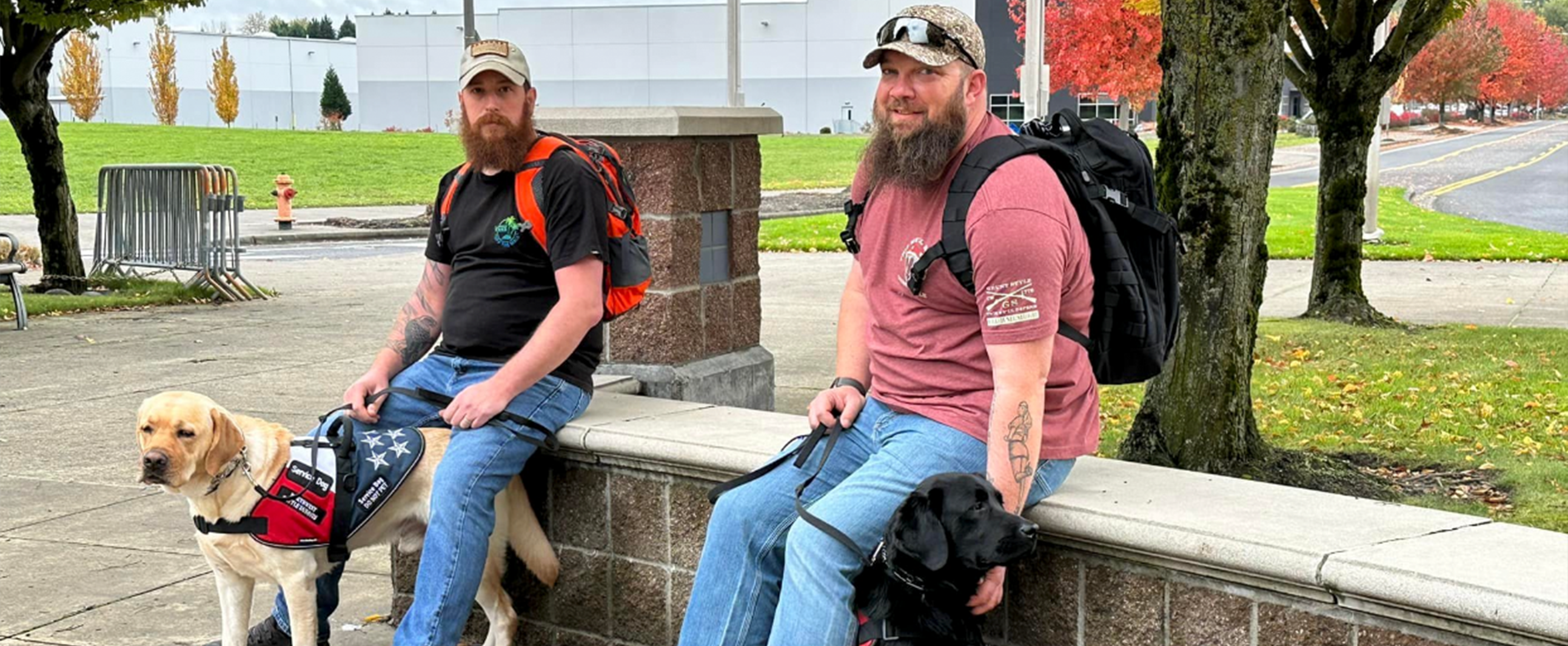Service Dogs and Social Connection Go Hand-in-Hand for Veterans with PTSD
For many Veterans with PTSD, crowded spaces trigger overwhelming anxiety – making social isolation a survival mechanism. But professionally trained PTSD service dogs are changing that reality, serving as bridges back to community life and meaningful relationships. While these dogs perform essential medical tasks to mitigate PTSD symptoms, they also foster social connections in more subtle ways.
Northwest Battle Buddies (NWBB) has witnessed countless transformations as American Heroes partner with these specially trained animals. Veterans who once felt trapped by anxiety are now stepping confidently into the world they once served to protect. Broken relationships are being rebuilt, isolation is giving way to connection, and most importantly, these heroes are finding peace again.
Read on to hear from real Veterans on how they found social connection again with the help of a PTSD service dog.
|
Through our Operation Never Quit (ONQ) monthly giving program, supporters help fund partnerships that restore not just individual lives, but entire communities. Joining ONQ to support these life-changing transformations. |
Service Dogs Help Veterans . . .
Reengage With the World
Bucky was introduced to NWBB after hitting a low in his life. Fortunately, he found hope again once paired with his service dog, Creed. With Creed by his side, Bucky didn't just survive; he began to thrive socially again.
“I’m a lot more engaged with other people during social interactions,” he shared. “It's been a lot easier for me to go out and do that stuff — I don't have to think about it anymore. I've built this foundation for this new life that I want to create.”
A recent Johns Hopkins clinical study validates exactly what Bucky experienced. The study compared two different groups of Veterans with PTSD, one with a service dog, and one without. Veterans with service dogs reported significantly decreased PTSD symptoms, alongside an increase in social participation.
As detailed in NWBB's analysis of the clinical findings, the research demonstrates that PTSD service dogs don't just provide emotional support — they actively facilitate social reintegration through specialized training and behavioral interventions.

Build Deeper Social Connections
PTSD service dogs do more than ease social anxiety — they empower Veterans to tear down walls of isolation and actively pursue meaningful connections. This can jumpstart the healing process for any strained relationships between family, friends, and romantic partners that PTSD once fractured — in addition to pursuing new, healthy relationships.
Bucky's experience with his service dog Creed illustrates this transformation:
"I'm starting to get back out and build relationships, both personal intimate ones and platonic ones. I'm actually maintaining those relationships instead of trying to destroy them . . . instead of putting those barriers up and pushing people away like I've always done."

Navigate Public Spaces with Confidence
While PTSD can turn crowded spaces into overwhelming sensory challenges, PTSD service dogs help transform these environments into manageable experiences.
For John, a Veteran paired with PTSD service dog Honey, the transformation was dramatic:
"Before Honey, I had not stepped into a mall in over 5 years. I was too anxious, and there were too many people. But I can do a mall now with Honey."
This represents more than shopping — it's about reclaiming the ability to exist in shared community spaces.
The ripple effects extend far beyond individual comfort. When Veterans can navigate airports, they can visit family. When they can handle crowded stores, they can participate in everyday errands. When they can attend concerts and social gatherings, they can share meaningful experiences with loved ones.
Andy describes this change with his service dog McGraw:
"I can now go into the mall or Costco and not have to be on guard. I have been able to fly to Florida to visit my family and watch my mom sing in a Christmas concert. Having him to comfort me has changed my life."
Mitigate Crises and Regulate Emotionally
PTSD service dogs can intervene during emotional crises, preventing escalation and preserving relationships. Bucky shares a powerful example with Creed:
"My younger brother and I used to fight a lot. One night it escalated to the point where it's me and [my brother] yelling at each other, screaming because I'm not in a good spot. I lost it on him,” he said.
“But Creed ran 30 feet and just tackled me to the ground and started licking my face . . . Within seconds I was happy, fine, I apologized to my brother, and we carried on. It was so different from what I've normally done in the past."
Give Back to Their Communities
One of the most inspiring aspects of Veteran recovery involves the transformation from surviving to thriving, and from focusing inward to reaching outward to help others.
Nick, paired with NWBB service dog Jazz, describes this evolution:
"I've found purpose in opening up and sharing my story. I hope it will help somebody else who's struggling like I am, or was, to get them to take that step."
This journey from isolation to advocacy represents a huge victory over PTSD. When Veterans feel confident enough to share their stories, they not only accelerate their own healing but also light the path for others still struggling in darkness.
The Ripple Effect of Healing
The impact of PTSD service dogs extends beyond individual Veterans to entire families and communities. When Veterans can attend gatherings, children have their parent back. When they maintain employment, families achieve stability. When they form friendships, communities grow stronger.
The stories of Bucky, Andy, John, and Nick represent countless American Heroes whose lives have been transformed through PTSD service dog partnerships. Their experiences demonstrate that with the right support, the invisible wounds of war don't have to mean permanent isolation.
Join Operation Never Quit today and be part of the healing journey that transforms not just individual lives, but entire communities. Every Veteran deserves the chance to reconnect with the community they served to protect.

